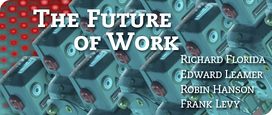Robin’s fun. He likes to modify words for me and tell me what I think. Kinda cool, actually.
So when I say “self-expression” he says “bohemian self-expression.” When I say “diversity” he says “ethnic diversity.” He says my concepts are “overloaded,” but in reality it’s his adjectives and modifiers that are really loaded.
He says that I infer that the woman I mentioned who changed jobs and careers from being a BLS economist to working at the Four Seasons Spa would also “like living in an area containing street mimes, bars and musicians, because they are also called ‘creative’.” Huh? Whaaatt? I never said or inferred anything of the sort. From what I can tell she lives in Arlington near Pentagon City. So much for her bohemian side. If I’ve not been clear on this, I should be: creative people (I’m buying the drinks now, Ed) come in all shapes, sizes, world-views and political persuasions. That’s a core argument of my theory, by the way.
Also, by the way, “creativity,” “diversity,” and “self-expression” are established concepts with a long record in the social sciences. I go to great lengths in my writings to further define them with great precision. I use the concept “creativity” (and yes, Ed, another round on me) because I believe it captures a very important dimension of economic growth not captured by concepts like technology, knowledge, information… but I’ve already covered that.
I’d much rather do more empirical work and let the facts speak for themselves. And in this regard concepts like “diversity” and “self-expression” actually appear to have a lot of utility, empirically speaking. I’m not the only one who has found this to be the case. As I mentioned before, have a look at the work of Marcus Noland and Jamie Peck at the Institute of International Economics. They found that “open attitudes toward homosexuality” capture a good deal of what is not explained by more conventional economic factors in accounting for international financial performance. Ronald Inglehart has found that political cultures that favor self-expression also register higher rates of growth. Both found these things independently, without reading my or each others’ work. I guess we could all have the same ideological or cultural agenda, but more likely there’s really something going on here that this work is turning up.
It seems pretty clear to me that America’s relative openness to diversity and self-expression of all sorts, while often noted as a cultural characteristic, also plays an important and neglected role in our innovative edge and economic performance. If it holds for the nation as a whole, it would only make sense that it would hold for its regions too.
One last thing: I have no stake in the cultural wars. None, Nada. How many times, in how many ways, can I say this? I already said that I’m a registered political independent, that my team runs the gamut from right to left and everything in between, and that what we all share is our interest in trying to better understand the factors that drive innovation and economic growth. We collect data, do empirical analysis, share our findings AND our data with anyone who is interested, publish our findings, and go back and do it again. That’s it.
Since I’ve been clear on this already, the only thing I can think from Robin’s last couple of posts is that it’s he who’s hung up on the cultural wars.

